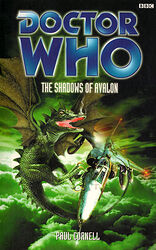
 |  |  |

 | Reviews for The Shadows of Avalon |
|
 |  |  |
There are 2 reviews so far. To add a review of your own for this item, visit the voting page.
| By: | Paul Speake, Wakefield |
|
| Date: | Friday 11 February 2005 |
|
| Rating: |    5 5 |
Not a bad read but the story just isn't a Dr Who story for me - bit of a traditionalist - sorry!
 |  |  |

 | Depressing and uninspired. |
|
 |  |  |
| By: | Mike McGovern, Edmonton, Canada |
|
| Date: | Monday 30 January 2006 |
|
| Rating: |    1 1 |
Paul Cornell's novels are always one big mess, and very depressing. The Shadows of Avalon can depress with the best (worst) of them.
The whole atmosphere of the novel is weird, sad, confusing, and unhappy - typical Paul Cornell muddle, in other words. Is this author even capable of writing anything cheerful?
The entire idea of the Brigadier grieving over the loss of his wife is unpleasant enough to start with, and Cornell simply heaps on the melancholy atmosphere as the story progresses.
The dear old Brigadier isn't even happy to see his old friend the Doctor when the latter finally shows up, spoiling one of the warm moments I look forward to in reunion novels; old friends reuniting, remembering the good times, going on one last Grand Adventure... Sadly, Paul Cornell doesn't seem to care much for nostalgia, except when it is used in unpleasant ways, such as in this book.
I never liked Cornell's Doctor very much. He seems just a little too distant, too unsympathetic and cold, so different from the wonderful, marvellous Doctor I grew up watching on televison. I get the impression that Cornell is trying to make a name for himself at the expense of Doctor Who, and he responds by abusing the format as much as possible.
But Cornell does something far more detestable then rewriting the Doctor in this book - he kills off the poor old TARDIS, possibly for good. What kind of faithful Doctor Who author does something like this? Repulsive beyond words.
I despise it when writers muck about with a brilliant format just to do something "different," which does not necessarily equate with "good."
Paul Cornell seems to be of those people who thinks that "living" characters, ie., people and aliens in a science-fiction series, are the only real stars of the show. But the Doctor Who universe is so filled with life, with vibrancy, that even the machines in it take on a life of their own.
The TARDIS is no mere machine. It is a well-loved character, with moods, temperments, and a personality that the audience cares about. It is an "old girl" to whom the Doctor feels tremendous loyalty.
There are people, probably like Cornell, who believe that one machine or spaceship is as good as another. What an unsymathetic way of looking at the world. A Doctor Who novel without the TARDIS is almost as bad as one without the Doctor.
This single selfish action confirmed for me Paul Cornell's true hatred of the Doctor Who format; that, and leaving the Doctor out of almost the entire novel.
From the beginning, Cornell seems to have had a vendetta against Doctor Who and everything in it. His every Doctor Who novel leaves nothing unchanged. Whereas other authors build up the Doctor Who mythos, Cornell's only pleasure seems to be in tearing down everything the series stands for. And now, the TARDIS... Is nothing sacred? Why do people like (or claim to like) his work so much? Who wants to read depressing garbage?
Cornell's writing is just as weird and graceless as ever, making this novel one long hard plow to read. One gets the impression that if it wasn't for the rest of Doctor Who, novels like this would fade and be forgotten, never achieving any sort of fame. Sooner the better, I say.
Oh yes, and the ending was lousy too.


